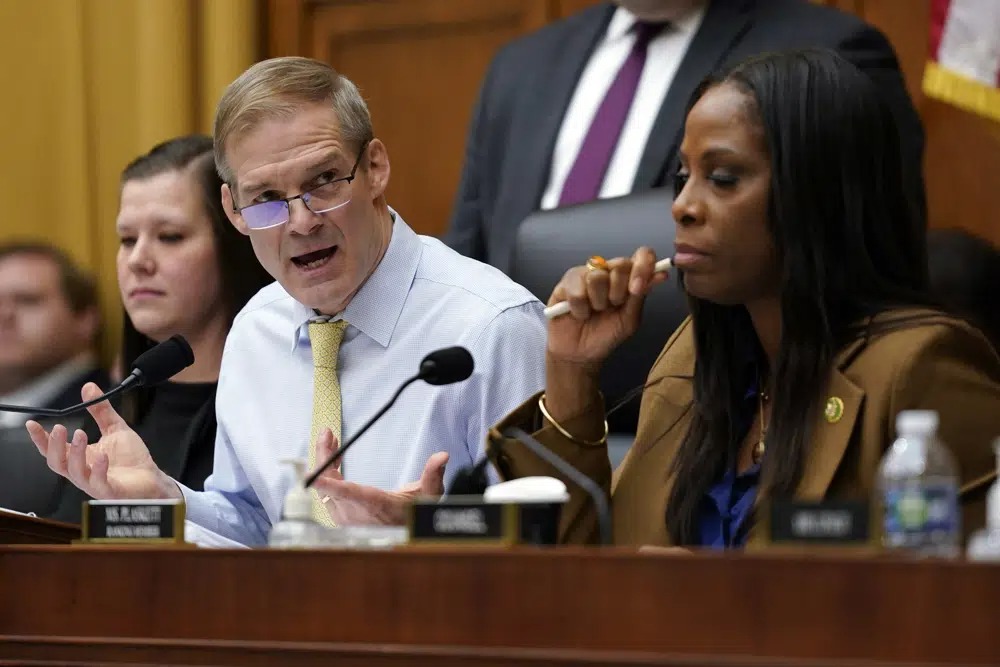House Republicans launched the marquee investigation of their new majority Thursday with an assertion that the federal government has been used against conservatives, drawing in current and former lawmakers to make a sprawling case that national security officials, social media companies and the media have been conspiring against them.
The first hearing of the new House panel on what Republicans assert is the “weaponization” of government, led by Republican Rep. Jim Jordan of Ohio, featured testimony about 2016 election interference, the COVID-19 crisis and the Jan. 6, 2021 Capitol attack, including from two top Senate Republicans. Much of it focused on grievances about actions taken by federal officials when former President Donald Trump was in office.
“It’s clear to me that the Justice Department and the FBI are suffering from a political infection that, if it’s not defeated, will cause the American people to no longer trust these storied institutions,” said Sen. Chuck Grassley of Iowa, the former chairman of the Senate Judiciary Committee, in rare testimony to the House committee.
Rather than focusing on new information, the hearing delved into long-standing conservative complaints about the Trump-Russia investigation and actions by FBI officials, including anti-Trump text messages, that have been documented for years. The FBI officials whose names were repeatedly invoked have long since left the bureau.
Sweeping in scope, the new investigation is likely to test public appetite for the kind of aggressive oversight and investigations that Republicans have made the centerpiece of their newly-minted House majority agenda.
It amounts to a high-profile platform for Jordan, the panel’s chairman, who after years of leveling attacks against Justice Department officials of both parties now has a committee gavel of his own to elevate his criticism and turn it into action.
Jordan said the first panel — comprised of Grassley, Sen. Ron Johnson, R-Wis., and Tulsi Gabbard a former congresswoman from Hawaii who left the Democratic Party —- was important in “framing it up.”
The second panel of lawyers and former FBI and Justice Department officials, Jordan said, documented the federal government’s “censorship by surrogate.”
He added, “Our whole objective was to sort of frame up how important this is and how serious it is. And I certainly think that happened.”
The hearing touched on a broad array of topics, some only loosely related, but laid bare the GOP desire to use the committee as a vehicle for attacking what they say are politically-driven decisions not only in law enforcement but also by those in the technology and health care sectors.
It also showed the complexity of issues around free speech and the free flow of information on social media, as the government is forced to keep pace with the new ways Americans communicate their sometimes polarizing politics, views and beliefs.
Republicans attributed their claims of weaponization to private interviews with dozens of whistleblowers over the last two years, when they were in the minority.
Grassley, an Iowa Republican, recounted a long list of oft-cited grievances about the origins of the investigation between Russia and Trump’s 2016 presidential campaign and complained about what he said was unfair media coverage and criticism of his inquiry into President Joe Biden’s family.
“They, in a sense, were basically calling us Russian stooges,” he said of attacks from Democratic colleagues.
Johnson of Wisconsin, formerly the top Republican on the Senate Homeland Security Committee, in his own statement to the committee linked the last two presidential elections, the Jan. 6th attack and the government’s response to the COVID pandemic into a wide-ranging allegation of wrongdoing by federal agencies ignored or covered up by the media.
“I have barely scratched the surface in describing the complexity, power and destructive nature of forces that we face,” Johnson testified.
Johnson raised questions about the origins of the coronavirus during the tenure of Anthony Fauci, the former head of a National Institutes of Health office. And as the Justice Department prosecutes Jan. 6 rioters for the attack on the Capitol, Johnson claimed the investigations did not “adequately explain why the Capitol was still woefully unprepared, or how many federal agents informants were in the crowd.”
In response, Democrats brought in Rep. Jamie Raskin, D-Md., a former constitutional lawyer and member of the Jan. 6 committee that disbanded last year, to make the opposite argument that it is congressional Republicans, not the federal government, who are weaponizing their oversight and investigative power, but against civil servants in the Biden administration.
And all of it, Raskin argued, is being done in an effort to find retribution for Trump as he embarks on a reelection presidential campaign in 2024.
“Now of course, a serious bipartisan committee focused on the weaponization of the government would zero in quickly on the Trump administration itself, which brought weaponization to frightening new levels across the board,” Raskin said.
Raskin, who serves as ranking Democrat of the Oversight committee, voiced concerns that GOP pursuit of federal agencies and their employees could prove to be dangerous. He noted that the FBI and Department of Homeland Security have observed an increase in violent threats against those individuals and facilities over the last year.
(AP)











